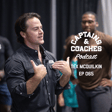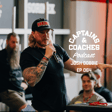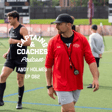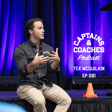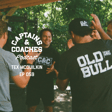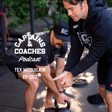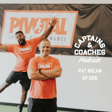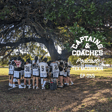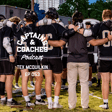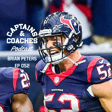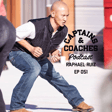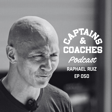The Rare Journey to Professional Sports
00:00:00
Speaker
The professional career, which by the way, never happens. It's 0% out of you know all the athletes that ever start get to get paid for playing sports. If you're so privileged that you get to play to the point where you're starting to actually age, that's a really unusual situation. And and in that case, you know the few dinosaurs that exist in professional sports, it's really about cultivating efficiency movement-wise because output is no longer what it was.
00:00:29
Speaker
and cultivating lack of symptom because if they just feel good enough at a certain age, you mentioned Lance Berkman earlier, being 37 years old and becoming an all-star, he could go out in jeans and flip-flops and hit home runs if he just doesn't hurt.
00:00:43
Speaker
You know, the skill level is so high You just need to get them feeling good enough.
Ben Fairchild's Transformative Approach
00:00:47
Speaker
Welcome to the Captains & Coaches podcast where explore the art and science of leadership through the lens of athletics and beyond. Today we're back in my hometown to talk athlete resurrection with Ben Fairchild, founder of Fairchild Performance in Houston, Texas.
00:01:00
Speaker
Ben has built a reputation for transforming careers, from helping aging professionals like Lance Berkman capture World Series glory at 36, to guiding youth athletes through foundational development that lasts a lifetime. But here's what makes Ben's approach revolutionary. He sees the human body as an interconnected system, whether he's working with an eight-year-old learning movement patterns or a 35-year-old professional veteran athlete fighting father time. We'll impact the dangerous trends of early specialization in sports, Explore why multi-sport development creates more resilient athletes and discover how the same principles that resurrect professional careers build unshakable foundations in our youth. Now, let's throw it out to Ben to help us raise the game. Ready, ready, and hooray. We're, we're in it. We're in Houston, Texas at Fairchild performance on location, right in the middle of a kickoff of summer training for youth athletes.
00:01:57
Speaker
So welcome Ben Fairchild. are we doing? Thanks for having me Chris. Yes. Joy to be here today. Yeah. I mean, just looking at the walls in your facility is Jersey upon Jersey and all of them with a very thankful message for your help in these professional athletes career from all sports.
00:02:17
Speaker
Yeah, we've been so fortunate to have a interaction with so many impactful athletes over time and the ability to kind of have an effect on them and in some way that matters to them is is has been nice.
00:02:29
Speaker
Yeah. Well, a lot of what I want to highlight is is from the ground up, the youth that you have training in there, the professionals, and what I want to lead off with is what I'm referring to as athlete resurrection.
Revitalizing Athletic Careers
00:02:42
Speaker
So some dudes have found you in their career and you've helped build them back better to step onto the field and then earn lots more money and freaking hit more home runs and do all the fun stuff on the football field. So where did you develop this knack for bringing guys back to life and high performance?
00:03:02
Speaker
Yeah, so for the most part, it was just good fortune. I was blessed with an opportunity to be ah mentored by a fellow named Mackie Shillstone in New Orleans, who Mackie Goodness, he was a trailblazer in this industry and and still ah probably doesn't get the credit he deserves for for being such an innovative thinker and and such a an intellectual influence on the industry, pre-internet, pre-social media.
Influences and Mentorship
00:03:33
Speaker
He's been at this now for probably 50 years, I would guess.
00:03:37
Speaker
But at the time, i was kind of learning and finding my way. ah had admired him from a distance. As a kid growing up, I had a couple of his books, ah which to think about now is kind of weird. I was into strength and conditioning when I was 10 years old, and whereas most kids, it's just sports. They like the sport itself, but not the process to prepare for it.
00:03:56
Speaker
I was fortunate enough to get an internship opportunity with Mackie now 20 plus years ago. and um And I think it just so happened that his forte or his niche, which was almost an imp impossible niche,
00:04:12
Speaker
was taking aging players and resurrecting their careers. And um this was in the early 2000s. He had been at it for over 20 years at the time. But at the time I was learning from him, um I got a chance to watch him work with Roy Jones Jr., who was attempting to become only the second boxer in history to move up in class to capture the heavyweight title. Previously in 1983, Bernard hawkins had, ah I'm sorry,
00:04:39
Speaker
um Michael Spinks was the first to to do this and he was the no one had done it since at that point so Roy Jones had done his research figured out who had trained ah Michael Spinks to do this and and he went out and hired Mackie Shilstone so ultimately he was successful he he became the second and only other I think since to ah to capture the heavyweight title by moving up in class to beat Ruiz became a world champion at the heavyweight level And being able to watch firsthand the the amount of planning and the amount of thought that went into this preparation process was such an opportunity for me. And I think because of Mackey's general mindset, a very, um yes, innovative, but also pragmatic thinker, he he he thought in a way that's...
00:05:30
Speaker
what's the best decision we can make in every situation, really accounting for risk very heavily. He's a risk management expert, essentially, for athletes. um That just tended to resonate greatly with my personality. I felt like, um particularly in strength and conditioning, because of the macho nature of it, probably a lot of risk takers are drawn to it. and That just wasn't my nature. I thought, you know, practically speaking, what's the best and worst outcome of every decision we make in the weight room?
00:05:59
Speaker
And I just so happened to run into a mentor that had that same, you know, intellectual makeup, you know, and that same personality when it came to
Success Stories: Berkman and Garcia
00:06:06
Speaker
strength and conditioning. So there couldn't have been a better pairing for me. And that really did kind of push me in the, on a trajectory to help aging athletes figure it out and extend their careers and extend their earnings over time.
00:06:17
Speaker
And then fast forward to 2010, Houston. I had the the opportunity to work with an aging Lance Berkman, ah who at that time was 35, was kind of on hobbled knees, had had two knee procedures that year, making it his fourth and fifth knee surgery of his career. he was 30 pounds overweight and and he came to me in a admittedly desperate situation, as he would describe. was contemplating retirement. He only had two offers to play the following season. He was coming off the worst year of his career.
00:06:49
Speaker
And um it was just kind of, again, right place, right time. um I happened to have a system that he responded well to. We assessed him and figured out what he needed. And then it all just kind of happened. you know his The 2011 season, he was ah an all-star again for the first time in five years. By the all-star break, he was leading Major League Baseball in home runs with 26 at age 36 and went on win the World Series. The Cardinals named him ah MVP of their team.
00:07:19
Speaker
Major League Baseball called him Comeback Player of the Year. And then Lance um didn't need to do this, but he graciously turned and gave me credit for having helped him find that path.
00:07:30
Speaker
ah The following ah year, it was Andy Pettit of the Yankees coming off of an 18-month retirement, trying to find the secret you know to to getting it back again, so to speak, at age 40.
00:07:42
Speaker
um The following year was Jaime Garcia, the World Series champion pitcher for the St. Louis Cardinals coming off of a thoracic outlet surgery, um which which is something that no one had ever returned to previous level of play from.
00:07:56
Speaker
a friend, Mike Reinold, who was ah a great physical therapist in Boston, had referred Jaime to us. That was a great opportunity. And then from there, it's just kind of continued to go in that direction. So it was really kind of an impossible place to find in terms of a specialty because there's so few out there that need that service. ah But just again, good fortune of being in the right place at the right time with a mindset that ah just so happened to match that that
Collaborating with MLB Coaches
00:08:22
Speaker
need. Yeah, the Berkman, I knew him probably 10 years earlier because he i lived across the street from me growing up. yes So it was fun. ah I mean, I've always been a fan just being an Astros guy and though then being a Berkman fan when, I mean, he opened up his doors and was just a cool guy to some kid across the street.
00:08:42
Speaker
Yes, an amazing player, but a much better person. Yeah, I believe it. the the The private sector and you stood up and opened up a facility in Houston and you get all these professionals that are targeting and coming to you for a reason.
00:08:58
Speaker
You also have to work with their teams, if I'm not mistaken. So how was that interaction professionally? Because the these professionals have their team staffs. sure That's a really good question and maybe one that should be more obvious to all of us, that the challenges that may come with ah with working with players who have um team assignments that are their careers to keep these guys healthy and on the field and there's a lot riding on it.
00:09:26
Speaker
I think that interaction should be a delicate one because it's the the team position oftentimes is unenviable in my view because you have little autonomy in cases to kind of explore your own philosophy um and the red tape sometimes disables you to a degree from being able to help you know, athletes to the level that you feel might
Trust Issues with Trainers and Teams
00:09:50
Speaker
Um, and then thirdly, I'd say, um just that every athlete in the team setting, particularly in the sport of baseball, probably has an expert that they're working with in the off season back home that they trust and they've put all their kind of eggs in the basket of their philosophy.
00:10:08
Speaker
And now I'm just ah a stranger that with the team that's kind of forcing them into a different philosophy. So there's just a lot of things working against team practitioners, unfortunately, that don't allow them to do their best job, so to speak.
00:10:22
Speaker
And I think approached carefully, there was a time, i would say, between 2012 and 2020, when COVID hit, the restrictions sort of changed with teams, where at a point I interacted with every strength coach in Major League Baseball.
00:10:38
Speaker
across all 30 teams and probably had really good working relationships with two-thirds of them because we had so many major league baseball clients that happened to be veteran in cases and really valuable to the team making it worth the strength coaches while to interact with us hear what we had to say about their offseason because of that trust that was built during that time which probably a really unusual and privileged situation i don't even know if that could happen again right now um the coaches tended to let the players do as they pleased because they trusted our guidance. So again, probably not a reproducible blueprint to to bridging that gap. I think there's a lot more hesitation around those relationships naturally, professionally, because, um you know,
00:11:24
Speaker
the the teams want to see that the practitioners have control of the player. You know, it makes sense. So there's just some some weird sensitivities surrounding that, but I think um anything can be worked out with relationships being built, you know.
00:11:37
Speaker
Yeah, that would be the aim. I've had friends at the the NFL level, and they've told me different stories. One was they helped an individual, and they were strength staff. They were on the staff.
00:11:50
Speaker
They helped them get back to cleared for hot, ready to go. and worked close with one of the the office, ah the the front office to get there.
00:12:01
Speaker
And then as soon as they got them cleared, cut off the street because then they didn't have to keep them on the the injured reserve payroll. true That's true. So that a poor taste in that coach's mouth and gave him a real glimpse of the experience on the business side of things.
00:12:17
Speaker
And then another friend at another team in position where he's challenged because his his head coach or one of the the sporting staff is pressuring him because his guys are going to external private sector individuals. Mm-hmm.
00:12:32
Speaker
So then the pressure from up top is saying, hey, you are not, you're not doing your job connecting with them. They're not getting value in you here. And so he was feeling pressured in this strength staff situation because guys would go off and find, find their own private guy, whatever city.
00:12:50
Speaker
Yeah. Yeah. And it's high pressure. You know, the the players feel the sort of a transient nature of their employment. And sometimes they seek outside help if they feel like the team does not have their best interest at heart, you know, which is can be helpful, but can also be dangerous if the two aren't communicating on what's happening. There can be a lot of overlap and, you know, overtraining can happen quickly and Yeah, over training. Time out.
00:13:19
Speaker
Let's take one minute to talk training.
Programs for Aging Athletes
00:13:21
Speaker
I'm presenting to you the Old Bull Program. This is the program that I am writing for myself, former collegiate athlete, former guinea pig of all sorts of training programs. I've seen and I've done it all and my body is feeling it in order to recover my joints, still continue to build muscle and look the part as a coach leading the way, I'm offering you Old Bull Programming.
00:13:45
Speaker
This is what I'm following. It is fun. I'm having a great time bringing in former athletes and colleagues into the party. Meet us out there for a seven-day free trial. Click the links in the show notes to give the Old Bull Program a run. Now, back to the show. Ready, ready, and hooray. What is a proactive approach that you take to then if a professional does reach out to you, you then go seek the the team's ah guidance approval? Hey, what program are you running? Can I compliment?
00:14:16
Speaker
What's your situation where you're reaching out here? Yeah, I think the smoothest way to sort of ease that um sort of that marriage or that um the trying to bring the two parties together is to allow the player to suggest a path because the player will have obviously a relationship with me. He's electively coming to me. He's not forced into that relationship, which is a huge advantage, by the way.
00:14:43
Speaker
ah versus the team setting. He'll also surely have a relationship with the team or some practitioner with the team. And I'll usually invite the client, the player in this case, to initiate that communication ah by way of text message or whatever makes them comfortable. you know and it's It's only in their best interest both parties should recognize if we can communicate and help one another. The situation is what it is. He sought outside help.
00:15:08
Speaker
Now, how can basically we help you keep your job as a team practitioner and we just want to work together with you because it's good for the client that we both care about, you know.
00:15:19
Speaker
ah So i think allowing the player to suggest a path of communication and initiate that. is probably our most advantaged, you know, mode of getting that done.
00:15:32
Speaker
Yeah. And do any of those strength staffs or performance staffs you are introduced to, do they ever start to ask questions and see what you're doing out here? Of course, yeah, and I think that's appropriate. You know, if I were in their shoes, I would have a list of questions and i would probably not be too excited that my player was going to visit an outside practitioner unless it was someone I had a ah longstanding relationship with and that had examples of success stories in such situations. so Yeah, it's just it's just not a great position to be in sometimes with you when you're with the team and you can be made a scapegoat on the competitive side of things.
00:16:07
Speaker
Sometimes someone's head just has to roll when you're not winning games and you have injuries. And oftentimes it can be the person who least deserves it in the case of strength and conditioning. So yeah that's what I mean by the the situation is unenviable when you're a losing team or an injured team or, you know, and frankly, you have little...
00:16:29
Speaker
ah impact on some of your most star and valuable players, you know. And the private sector as well is also challenging when you have high schoolers coming in because a lot of the football players, they have their strength and conditioning program with their high school coaches. That's right.
00:16:45
Speaker
We're starting to see a growing trend where schools are employing a strength and conditioning coach versus low man on the totem pole of the football team. Yes. So, are you having proactive relationships and conversations with athletic directors and football coaches? We're trying. We're attempting to initiate these conversations as part of our effort, in fact, recently to to really connect with every local school and at least, uh, offer a free resource if they want, you know, additional, um, options for free education. And we love talking shop. It's one of our favorite things to do because we're passionate about the subject matter.
00:17:24
Speaker
Um, but again, that there's understandably there's, uh, sometimes, um, you know, a perceived conflict of interest, you know, there with even referring people to us and that sort of thing.
00:17:35
Speaker
We would just want people to know that we're really passionate about what we do. We know that we have to consider the entirety of their exposure, including school influence, respectfully, to be able to help them properly and not overwork them. So um again, it's just about the opportunity to form relationships is what probably leads to the best outcomes, but it's not easy, you know, and they've,
00:17:57
Speaker
They've got so many people probably trying to contact them. I understand why they wouldn't always be so
Youth Development and Hidden Injuries
00:18:02
Speaker
responsive. so Yeah, it's it's a different difficult population to work with. And high school is still like they're trying to hide all their secrets of winning.
00:18:12
Speaker
Right. Where college, it's here's our whole playbook. Here's our whole summer strength training program. Try to do it better than us. So it's very open. I'm hoping that trickles down to high school, but it's still trying to protect your precious sure playbook. Sure.
00:18:29
Speaker
um Well, sticking with the youth, and I want to talk about the foundational development. And I've heard from another interview, we have the perspective of training eight-year-olds and professional athletes very similar.
00:18:42
Speaker
So where where does that foundation lead to becoming a professional? And what's your approach if you get a a green kid in here, 13 years old, never touched a weight in his life? Mm-hmm.
00:18:53
Speaker
Yeah, in the end, they're both human bodies. You know, in majority cases, two arms, two legs, a head, you know, a spine. ah So in one sense, we're still coaching human movement. And we want, whether it's an eight-year-old child, as you referenced, or a 28-year-old NFL linebacker, they still need to understand how to move all those parts properly. So it is, one, about movement quality, two, about incremental movement.
00:19:20
Speaker
fortification of that movement quality with a greater intensity challenge, you know, changing some of the variableials variables, be it the amount of load they're working with or against, the stability of the environment, um you know, the competitive distractions of seeing something move in front of them and having to react to it.
00:19:40
Speaker
In the end, we're just coaching kind of a progression you ah human capability regardless of the age level. I think the biggest difference in training 13 year old and a 33 year old athletically is that the 33 year olds sort is that the thirty three year olds um sort of a tolerance to variability is significantly less threatening when they're that well developed and physically mature.
00:20:09
Speaker
A 13 year old with too much intensity put on them can, you can do some damage pretty quickly that may or may not show up at 13, by the way. And we see this with pitching with, uh, with MRIs of elbows that are damaged or cross threshold at 22.
00:20:24
Speaker
But there's a history of overthrowing that never caused symptom, but it was causing underlying pathology. So I think just the just understanding kind of where the the threshold for damage lies in each athlete.
00:20:37
Speaker
And it's much more about ah building habits movement wise as ah as a young athlete. and then ah being able to incrementally challenge those things. Whereas for an aging athlete, we're probably trying to to cut corners to make them more efficient as they start to lose output very late in their career. And and again, this is ah this is a 1% of 1% of the athletic training population. The guy who's now so good at what he does, but so old that he's starting to lose power.
00:21:06
Speaker
It just never happens. A professional career, which by the way, never happens. It's 0% you know, all the athletes that ever start get to get paid for playing sports. If you're so privileged that you get to play to the point where you're starting to actually age, that's a really unusual situation. And and in that case, you know, the few dinosaurs that exist in professional sports, it's really about, ah sort of cultivating efficiency movement wise, because output is no longer what it want was and cultivating lack of symptom, because if they just feel good enough at a certain age, you mentioned Lance Berkman earlier being 37 years old and becoming an all-star, he could go out in jeans and flip-flops and hit home runs. If he just doesn't hurt, you know, the skill level is so high.
00:21:54
Speaker
You just need to get them feeling good enough, you know, from both sides to play. That's a good point. Yeah. For him. And, While we're on that 0%, how are you communicating that to parents with unrealistic expectations of their kid that are coming in to you and maybe hold you accountable for their, if they, it's actually 0%.
00:22:16
Speaker
I really like that question. ah Not in a condescending way, of course, because everyone, you know, thinks, rightfully thinks highly of their child and wants them to have the, you know, endless opportunity.
Barriers to Professional Sports
00:22:29
Speaker
But I'm a statistics mind, a statistics person, and the sad reality is that 99.999% us were eliminated from contention from any professional sport.
00:22:42
Speaker
at birth the moment we were born and we were 17.5 inches and not 20.6 inches and our parents did not play professional sports we weren't going to the big leagues we weren't going to the nba so you could pretty much put all your money on that the day a child is born so to think that anything between that day and age 21 or 22 is going to have an overhaul impact on that is foolish statistically uh so just you know not being discouraging with parents who have high hopes for their kids, but also laying out kind of the, there's certain metrics that natural selection shows us predict professional outcomes for athletes.
00:23:25
Speaker
ah If we're looking at the world of major league pitching, mobility is going to be the telltale. You know, if a kid has clinical hyperlaxity, if he can, you know, put his forehead on his knee, but also produce lots of force,
00:23:40
Speaker
and has some, quote, athleticism, odds are he's still in contention to pitch at a high level. The moment a kid, um you know, we measure his shoulder external rotation at age 12, and it's 92 degrees on his throwing side, not 122 degrees, it really doesn't matter what we how we train him, he's not going to the big leagues to pitch. you know, and I think that's a...
00:24:03
Speaker
It's a fair conversation when we assess a young athlete to say, hey, how much do you enjoy playing second base versus pitching? Because you can pitch for a couple more years and have fun at age 12 and 13. If you've hit puberty first, you'll probably strike out a lot of guys.
00:24:18
Speaker
um But the bottom line is you don't have the underlying range of motion attributes to pitch at a high level. And that's probably more a conversation for the parent than the 12 year old, because it could be pretty disheartening for a kid.
00:24:29
Speaker
But the bottom line is that, you know, it doesn't matter what we do for the kid who's not naturally selected to pitch at a high level. He's not going to pitch at a high level. So I think it's important to just lay that out for a parent. and He can still play baseball at a high level. It's just not going to be on the pitcher's mound to him.
00:24:47
Speaker
Yeah, the coaching high school lacrosse and for high school, so making peanuts, doing it for the love of the game, I'm able to have a level set conversation with kids and parents.
00:25:00
Speaker
My challenges come when parents then take them to a special skills coach. So an outside coach, and i I do my best to explain that they're also paying this coach $3,000 for three months and they're creating what I'm referring to as fantastic lies.
00:25:20
Speaker
So telling them exactly what that parent wants to hear to keep that money train going. So when I see and communicate otherwise on our high school field, on their team, now all of a sudden I become an enemy.
00:25:34
Speaker
And so it's, it's me reframing and trying to level up this conversation. To now, instead of going to the tip of the spear division one, as promised by the outside coach, we're taking, not saying we're going to division one, we're going to focus on college lacrosse.
00:25:51
Speaker
So now we've opened up all these different windows of opportunity, different levels, different schools. So it's, it's helping them understand not taking away like the number one dream of Notre Dame lacrosse national champion.
00:26:05
Speaker
Let's just present college as an opportunity. Sure. Because often, even after d one there's only two rounds of the professional draft at this sport and not a lot of teams. Right. So maybe your sons, it'll be a whole different experience, but.
00:26:20
Speaker
Right now, here's the reality and let's let's try to keep a dream alive. Sure. but But it took me a lot of failed conversations to realize where I did go wrong to then now present in future like Syracuse is off the table, brother, from where geography and genetics.
00:26:40
Speaker
This is Texas. It's just not going happen. You're not going to get recruited. Right. And then one note on the the recruiting, I've got friends that are D1 coaches and what they've done now, and this is going to help lead to our next topic is if For D1 lacrosse, you get recruited in eighth, ninth, and 10th grade, and then you verbally commit and then sign on in your 11 year.
00:27:03
Speaker
So coaches are are watching these eight, nine, 10 year old age groups and going and seeing how many tournaments they go to, how many travel tournaments they go to.
00:27:13
Speaker
And if they see the same names, they're marking them off the list. Because that kid, by the time they're sophomores are going to be burned out of the sport.
Challenges in Youth Sports Training
00:27:21
Speaker
And all of a sudden, all of our recruiting class is gone because they were overplaying the sport, especially travel, because with travel sports, and you know this from baseball, it's just games. Right. There's no practice, no development, no reps.
00:27:36
Speaker
I'm just getting traveling, getting four at-bats. Right. Maybe the ball's hit to me, maybe not. Waste of time. No development. Yeah. Um, which I'd love to transition into specialization because everything that you know about baseball is working its way into lacrosse and ruining the sport.
00:27:55
Speaker
Well, it's such an interesting topic and you could, you could force me into presenting an argument for either side specialization or not. Um, I'll start with the argument against specialization because I feel like that's probably, that would be my view with my own child.
00:28:14
Speaker
is that um let's just step back and look at the machine of of sports development and what's valued now. Because it starts at the very top and trickles its way all the way down to six-year-old development. Because parents are watching professional sports, seeing what's valued.
00:28:32
Speaker
What's weird is that by the time their kid is... 13 years older and ready for a professional contention, ah what will be valued will very likely swing back in the other direction. It's a pendulum and it works from in pitching from velocity to sustainability back to velocity to movement.
00:28:48
Speaker
There are a lot of things that are being valued at different areas as you know data starts to become more and more refined and we figured out figured out what actually gets players out or hitters out quickly.
00:29:00
Speaker
um But what's valued now in professional sports being velocity, for instance, in pitching is going to have its effect on the need to specialize. So in other words, like if I'm going to be able to throw a hundred miles an hour when I'm 23 years old, I have no option but to throw way too much to develop that level of skill. So Essentially, the the you know the the skill level ends up writing checks that the the physical development just can't cash. We've got kids that are you know throwing high 90s at 16 and 17 years old. When James Andrews did a study not so long ago, probably a decade ago, ah just looking at tensile force... um
00:29:48
Speaker
I guess tolerance for the oral collateral ligament in the throwing arm. And basically for an 18 year old ah at 90 miles per hour of throwing velocity, which means 8,500 degrees of humeral spin, it's the fastest movement in humankind at 90 miles per hour,
00:30:07
Speaker
An 18 year old's UCL was redlining. Basically it was a crapshoot as to whether or not he was going to tear his UCL and this was across the board. So if you are throwing more than 90 miles per hour at an average ligamentous maturity of 18 years, you really are, it's roulette.
00:30:23
Speaker
You may or may not blow out your UCL. There's really no formula ah to to accurately predict that. So that just tells you that if I'm going to get to 100 miles an hour by the time I'm in professional contention, the last time being 21, 22, and 23 years old coming out of college, I've got to be throwing a certain speed by a certain age to get there. that You don't just get 10 mile per hour increment jumps.
00:30:46
Speaker
So... To throw 100 plus at age 21, 22, or 23, I probably have to be throwing at a minimum 90 miles per hour at age 18. And we've already seen the studies that anatomically, I can't withstand that amount of tensile stress on my UCL.
00:31:03
Speaker
consistently at age 18, ligamentous maturity doesn't happen until age 21 in most athletes. So um the argument for specialization is that I've got to overthrow to get good enough at throwing hard enough soon enough to get to the big leagues.
00:31:22
Speaker
The argument against it is quite simple. you can't throw too much soon enough, hard enough to get to the big leagues and not get hurt. you know So truly, when you look at those two sides of the equation, the only pitcher that it can get there is a pitcher who throws too much,
00:31:38
Speaker
but was designed at birth to be really tolerant to high level level ligamentous stress and also has a very special nervous system that can adapt to that much skill work and actually it takes. They become better and better and better at throwing hard.
00:31:53
Speaker
So it's a really complex, but then again, simple formula. But you can argue in either direction. i mean, a healthy kid is that's throwing 80 miles an hour because he did things the right way is not getting to the big leagues.
00:32:06
Speaker
A kid that's thrown too much and now throws 100 miles per hour but gets hurt also is probably not getting to the big leagues. One surgery from the moment that you get drafted into the major leagues, between the time you get drafted and between the time you make your debut, reduces your chances of you ever making your major league debut by 50%. single surgery.
00:32:25
Speaker
ah single surgery So that tells you what you need to know about injury prevention and its importance for getting to the big leagues. But if you got injured, guess what? You probably did the amount of throwing that was required to be able to throw a hundred miles an hour. So we're really kind of in between this rock and hard place. And I would argue the best predictor of, of, uh, of success and getting to that level has nothing to do with your training regimen. Of course, your training regimen matters.
00:32:53
Speaker
But it has much more to do with how God made you and your genetic makeup, your tolerance for stress ligamentously and your ability to acquire skill. Basically who were your parents?
00:33:05
Speaker
Who are your parents? That is a good one. Cause I've also seen in John Smoltz called this out in his hall of fame acceptance speech, parents that are having kids do their Tommy John surgery when they're not injured.
00:33:18
Speaker
That's fascinating. And that is by the way, insane. Uh-huh. That's a, if, if it's criminal borderline. well you don't You don't elect to have surgery on a minor that's not injured. just that That is the stuff of lab rat, science fiction weirdness.
00:33:41
Speaker
Well, they they were or heard it or somebody did it and then it worked for them. So, yeah, it's it's very interesting. I mean, Paris, they I've had a lot of interesting conversations that I never... It surprised me and I have to reflect...
00:33:57
Speaker
and then learn from those because some of the initial conversations and having to navigate them in regards to performance is, I have a new one every year that just blows my mind. yeah that is mind blowing.
00:34:10
Speaker
I'll give you that. Yeah. for So now you're not just baseball, you're getting a lot of kids in here for that are are athletes. Sure. and And for training trends, you probably run classes, it's volleyball, it's basketball, it's football, all smorgasbord, and you're focusing on athletic development.
00:34:30
Speaker
How is what's your approach to then developing their characteristics their intangibles their communication their teamwork within this this arena? Sure ah It actually it reminds me I'm glad you you know asked it in that sequence, but When you think about back to the specialization idea, sorry.
00:34:49
Speaker
When you think about the, the, the value of not specializing, I'd like to touch on, because i think that that is really the way in that i feel about development my heart, with the exception of certain sports that are, you know, ah unduly skill laden, like pitching in baseball.
00:35:08
Speaker
Um, I think the the totalic development of a young athlete, the ability to do many, many things, kind of ah a spectrum-based athletic development approach for any sport individually,
00:35:24
Speaker
pays dividends at the higher levels. Because what we notice is now that the having done this for over 20 years, the kids that we're seeing now that are that are getting Division one opportunities as pitchers, in cases, can't walk and chew gum. They can throw a baseball 95 miles per hour.
00:35:41
Speaker
But if you ask them to do anything outside of their little sleeve of athletic development with pitching, for instance, they're less and less capable of doing those things. Mm-hmm. The problem with that is not only it suggests a history of overuse with one thing, so that's injurious, but two, your ability to make adjustments to form into mechanics when you're at a high level almost sheerly depends on your ability to be athletic.
00:36:11
Speaker
Because if if you're so pigeonholed into one form of development, you have a significantly difficult time making skill adjustments at a high level. And guess what happens, by the way, when you get to the highest level of baseball?
00:36:25
Speaker
As a hitter, you're having to make adjustments sometimes for the first time in your career, because wherever you came from, you were always the best. And at the next level, guess what? You were probably one of the best. And then it kind of continued in that way.
00:36:38
Speaker
You get to the highest levels of the sport with anything. Invariably, you run into other people that weren't in your small pond that were the big fish, wherever they were. And you're having to now, for the first time, really adapt to what they're doing because it's better than what you're doing.
00:36:54
Speaker
And what we see is with with multi-sport athletes that are now at the highest level, a lot of our hitters in a major league program played quarterback in high school. They played point guard in high school. Those guys have an ability to sort of, they're a little more malleable skill-wise when they get to ah the pro level because they have ah spectrum of athletic development growing up, whereas the kids that didn't have that exposure just can't make adjustments and they kind of go by the wayside over time with pro sports. You see them have shorter careers, you know?
00:37:25
Speaker
yeah they're coordination they're less coordinated and then they're less coach able that's right that's that's a good term coach able yes yeah taking that feedback and then having the coordination to make that minor adjustment on the swing or arm position they have the the mind body connection to make that that's right yeah Wild. Yeah. Within respect to lacrosse and specialization, we see that at goalie.
00:37:53
Speaker
isn The rest of the sport is just so creative. You have set plays, but if something goes wrong, Athlete's going athlete. Right. And so you just have to get creative.
00:38:04
Speaker
And so even in practice, problems arise. That's right. But then goal is just one, one special thing, one, one step here. And then watching the the highest level, it's the most athletic individuals.
00:38:16
Speaker
So aim to bring that athletic development to this position where you're not doing a lot of running and cutting. You're stagnant for most of the time, but you're quick. That's right. So aiming to, and then the game is evolving. That's why I love sports. It's just different strategies of evolve where now my, if my more athletic, my goalie is more, you can leave the cage and help well in different
Specialization vs. Multi-Sport Development
00:38:39
Speaker
scenarios. So yeah, seeing an evolution there and, um,
00:38:43
Speaker
But then still the parents want to specialize this kid, specialize this kid. And here's one one of the nastiest experiences I've had as a coach is a goalie struggling to to learn to throw or or with a difficult long pass.
00:38:58
Speaker
So then take him one on one and just try to work on fundamental throwing like a baseball. Lacrosse, we want to throw over the top, just like a baseball. So then take the stick away and just work on the same foot position, the same like a pitcher, big step.
00:39:12
Speaker
opposite arm, opposite leg, and struggled with just throwing a ball like a baseball. And then his dad was watching practice and screams in front the whole team, you're never going to fix that.
00:39:27
Speaker
Oh yeah. Kid heard it. I heard it. I mean, the team, I don't know if they were not engaged, but this is, this is real. Right. So like, I'm, I'm getting goosebumps, like blood boiling, just thinking about this, but you, the dad is right.
Learning from Failure in Sports
00:39:41
Speaker
Cause now it's ingrained in him. So it's, it's, it's just wild that specialization and hovering and, uh, Yeah. I mean, not allowing yourself to fail. That's why I feel passionate about sports. This is arena where we're independent of a mom and dad. Right. We can fail.
00:40:01
Speaker
Right. And then learn how to respond to failure. Right. The beauty of baseball, iss it's the next pitch. It's the next at-bat. It's the next time up. And in lacrosse, it's the next play.
00:40:12
Speaker
Right. And if I let a goal in, Well, my team's still counting on me to stop the next one. Right. Which is, I mean, that's, that's responsibility. That's life. Right. So it's interesting to see where specialization to get to the top, but at the same time, I feel environment and support network is also important to your success when sport ends.
00:40:35
Speaker
Because even if we're looking at all these dudes on the walls, sport ends. Yeah, you're right. I love that you mentioned, uh, failure and the ability and, and essentially allowing one to fail as a parent.
00:40:49
Speaker
Um, it, it lead, it calls to mind a story about the, uh, 2024 NFL playoffs. Um, a client of mine, Kaimi Fairbairn had really big opportunity to, uh, hit essentially, I can't remember now a game time game winning field goal, take the Texans to the FC championship game.
00:41:09
Speaker
And, uh, And for whatever reason, it wasn't his his moment. he He misses the kick. there's some other factors involved in terms of the technicality of it. But the camera panned to him naturally right after the missed kick.
00:41:26
Speaker
And i asked him about that as we as we started to review the season and and went back and ah and looked at it. I just said, what were you thinking in that moment? Because I remember watching him and thinking, man, he is...
00:41:40
Speaker
completely serene externally. Like that, it's remarkable. And I admire that about him greatly, his his ability to process both failure and success. And I think one of his greatest gifts, something that's frankly allowed him to perform at such a high level with such consistency now for so long,
00:42:00
Speaker
is yes, his natural but also trained ability to process outcomes, be it success or failure. But what he said back to me when I asked, what are you thinking in that moment? He said, what did it look like? And I said, well, honestly, you just looked blank. I didn't see anything. He said,
00:42:19
Speaker
Okay, that's good to hear because his goal is that within ah a period of time, a short period of time, if you were to see him, you know, right after a game winning kick or conversely, ah ah you know, an awful miss, his goal would be that you couldn't tell what had happened on the previous play. He allows himself a very short window to process that because as you mentioned, there's gonna be another opportunity shortly thereafter likely and you have to have cleared the previous failure or success to be able to have you know a perfectly neutral chance of performing in the next one. And you see it with major league hitting.
00:42:53
Speaker
If you're the best hitter in the league, you're gonna 68% of the time. you know um so But that starts at a young age and a lot of it is parenting. It's a lot of it like allowing a child to fail, allowing them to process that failure in cases, allowing, of course, when they succeed, ah being able to not get too high on that. you know Time out. Tech's here at trainheroic headquarters meeting with the team to talk about the coaching experience that I'm able to provide for my athletes.
00:43:23
Speaker
So if you're a coach and want to put your program out there on an app that athletes actually enjoy using, trainheroics for you. I've been using it since 2014. delivering literally over tens of thousands of workouts to athletes. And Train Heroic allows me to provide the unique coaching experience that I want to.
00:43:42
Speaker
Uploading video, providing coaching feedback, directions, and building a community, that's why I love Train Heroic. And if you want to take your athletes where they can't take themselves, that they want to go, head to trainheroic.com slash captains and check out how you can deliver programming to them.
00:43:59
Speaker
And now, back to the show. Ready, ready, and rip.
00:44:05
Speaker
On that success, here's a while i I still coach the sport. One observation is week one wins and losses. Parents tend to hold on to them in week five, six, seven, eight, nine, 10. So coaches, we make adjustments and it's on to the next game.
00:44:21
Speaker
So sometimes the mistakes that a coach makes or a kid makes, the parents are still holding on to. as we get further and further into the season. So it's very interesting where we're even thinking next at bat, next pitch, next kick.
00:44:35
Speaker
Parents are still on weeks ago game. yeah Coach doesn't what talking about and references one, two, three things. right Nasty stuff. for Going back to the sessions with the team, so what is your coaching now to these these younger athlete groups to develop that mindset where they can process wins and losses and then it's it's the next rep?
00:44:58
Speaker
Yeah. um I would say, you know, in our setting, because we're we're sort of isolated to a non-competitive atmosphere officially, there's some competition, you know, athlete to athlete and like, can I get this weight off the floor or not? That sort of thing.
00:45:15
Speaker
But I would say we're set up. you know In some ways, unfortunately, for a relatively small percentage of failure in our specific setting, when they get out and compete, that's when they really have to process failing. So it's mostly accumulating wins here unless they're not trying, you know because we try to lay out a path that they can incrementally conquer and get better at and get more challenged by.
00:45:35
Speaker
ah But yeah, a lot of it is just conversation because we tend to catch athletes either on a high or on a low, uh, you know, they're coming off of something always when they come in, be it a successful season, an injury. We tend to encounter more of the lows because then people seek us out when they're in a bad place because they've been repeatedly injured.
00:45:55
Speaker
They hear about our process and they come in in a desperate situation. So, um the the good news about that for us is that you're usually when you're in desperation you become very open-minded their ability to sort of uh
Proactive Athlete Development
00:46:09
Speaker
truly self-abase absorb what we're putting forth is a real advantage for both of us because we can probably get somewhere if they're willing just to subject themselves and surrender to our process if someone's coming off of a great success understandably, they're probably not that motivated to change. They shouldn't be because it worked, you know. So I think um our our ability to to help them process failure really lies in our ability to help them not fail, you know, because we're we're giving them tools to this time we won't get hurt, we won't lose because you're a good athlete and you're going to stay healthy, you know. So
00:46:47
Speaker
we're We're less on the middle, ah side of like actively teaching how to process failure or more so on the solution side of not failing again. Yeah. My solution for that foot races, just one-on-one.
00:47:02
Speaker
Yeah. 15 yards. There's no shy. and I mean, we're, we're not risking forties or anything. There's no risk involved except winning and losing. Yeah, not a lot of hamstrings at 15 yards. but Yeah, and it's fun.
00:47:16
Speaker
Or spike ball. don't know if you've got a spike ball net here. Have you heard spike ball? I've heard of it, but I don't i don't know what that is. Oh, it's... Is that where you hit it down into the trampoline? Yeah, so it's like a little ah circular volleyball. I don't know. It's fun. Sure. And not a lot of risk there, and certainly some athletic creativity involved.
00:47:34
Speaker
Yeah, and pretty competitive, I can imagine, if you get the right people playing it. Yeah, you get some of these teenage athletes, boys versus girls and mixing it up. And then a phrase I've been using a lot is response ability.
00:47:48
Speaker
So two words. Sure. So training how they're responding to the wins and losses adversity ah or even hamstringing them, pun intended, if it's two versus one. oh So if it's spike ball two versus one, it's like, well, this is unfair.
00:48:02
Speaker
Life is a are you responding? Yeah. So it helping to, to gamify, uh, responsibility. Yeah, want to use that. That's good stuff. Yeah. Um, like coach able two words.
00:48:14
Speaker
Mm-hmm. So trying to, uh, present to that, how are you responding to different things? Mm-hmm. Because a ref, I mean, refs are, they're people too. Right. They're going to make mistakes. Right. And even though it's not fair or it is the wrong call,
00:48:30
Speaker
How are you going to respond that sets up success for the rest of the game? Sadly, there probably will be no wrong calls, as we were talking about with AI going forward. i thought the High schools can't afford that.
00:48:41
Speaker
there'll come a couple of point when we're go to have robots coaching bitty basketball, i mean, refereeing bitty basketball games and making... perfect decisions, you know, which is scary, but. Not in my league. All see to it.
00:48:53
Speaker
All over coach just to to prevent that from happening. Bring value to the scenario. ah Winding down, I want to talk about coach development.
00:49:04
Speaker
she You have young coaches come in, they get their opportunity from personal training to group training to working with some professionals potentially.
Building a Coaching Community
00:49:13
Speaker
so how what's your approach to welcoming in a new coach do you look for somebody with experience certifications or green that you can teach your process and then lead them to your professional level and standard of of coaching sure both um so we we are looking for the right people at all times so we have five well-established core values and
00:49:39
Speaker
We interview and hire ah based on ah kindred core values, essentially. So we if someone is at this professional age, one all of our trainers are degreed and certified, but as ah as a prerequisite to interview, but...
00:49:57
Speaker
We have an academic internship process, which teaches our process over the course of an 11-week semester. It's very competitive to get into the internship. That's our most viable path to a ah full-time coaching job here.
00:50:13
Speaker
But i think above that, ah we value the type of person someone is as opposed to their knowledge level at a given time, because we can offer them acquired expertise over time, teaching them what we've learned over decades of service.
00:50:30
Speaker
But we cannot take someone who understands it all and make them into a good person. And we've, we really do value the personal part of personal training. So much of it is dealing with a human being, understanding how to relate to them, responding to the where they are in a given day and kind of meeting them where they are.
00:50:48
Speaker
And those aren't people skills that we can teach. Most of that happened in the home a very long time ago. to touch on your, you know, a parent with a child, allowing them to experience failure and process that and work through it in a healthy way. So many of those lessons that we're now dealing with as adults and professionals, they were taught long, long ago before we ever met this person.
00:51:10
Speaker
And the ability to kind of, you know, teach someone that now at an older age is just not a project that we would be able to successfully take on or could. We want good people that have a passion for what we're doing, having attentiveness to detail, having a heart for service.
00:51:25
Speaker
And then we can make them experts over the course of time. You know, that's what we really offer on the sort of joining our team um front. Yeah. so Sweet.
00:51:36
Speaker
Well, man, I appreciate your time. And I'm going to get a picture in front of this wall just so I can see the difference between my wingspan and JJ Watts. But the yeah beautiful facility, lots of space, lots of turf, and even a golf simulator in the back. That's right. Track man. Yeah. Which, I mean, that's where I would learn how to fail getting on that thing before getting out into the the real world goal I've had a real education in that failure too, so don't feel bad.
00:52:04
Speaker
Cool. Well, thanks for your time, man. Thank you, Chris. Yeah. It was fun, man. If you're in Houston, Fairchild Performance, check it out. And if people want to continue to learn from you and your journey, your growth, where should they learn? Sure. They can find us on Instagram at FSP, I think, underscore training. And that's probably where put the most of them.
00:52:25
Speaker
The majority of our Con Ed opportunities is just on social media now. Sweet. Well, and on that note, all right we're getting an important call. So thank you for everyone for tuning in.
00:52:36
Speaker
Thanks, Chris. See you.



